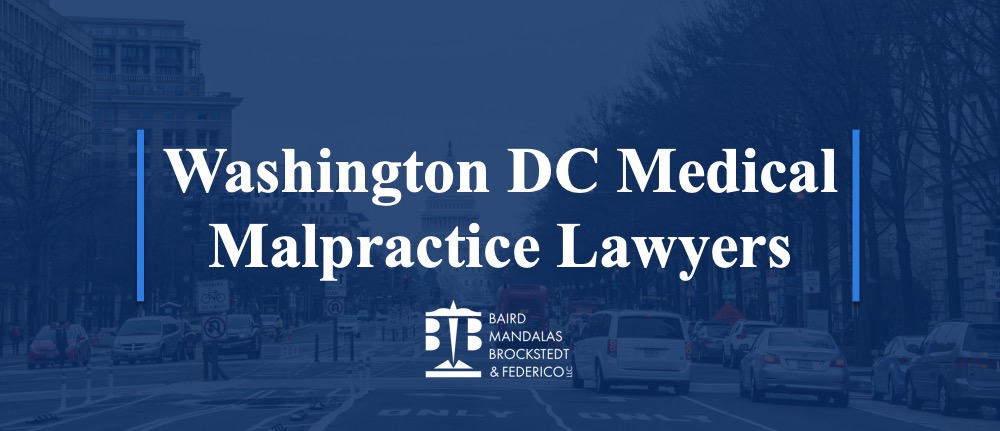
Everyone will likely visit a doctor at some time in their lives. When you go to the doctor, you expect them to use their skills and expertise to diagnose your condition and recommend a treatment plan.
Unfortunately, negligent care and treatment can delay recovery, exacerbate an illness or injury, and even result in death.
When a provider’s negligence or wrongdoing causes further complications or injury, you can file a medical malpractice claim to recover your damages.
Contact Brockstedt Mandalas Federico so one of our medical malpractice attorneys in Washington D.C. can review the facts of your case.
Types of Medical Malpractice Claims in the District of Columbia
Medical malpractice claims arise in several different scenarios. Below, our team has provided details and examples of common medical malpractice issues.
Premature Discharge
Premature discharge refers to scenarios when a patient is discharged from a hospital before they are physically healthy enough to leave. Prematurely discharging a patient can worsen their condition and result in further complications.
To prove a negligent discharge, you need to prove that a doctor with similar training and experience would not have discharged you in the same condition. Before they can discharge you, a doctor needs to evaluate you as a similarly trained physician would.
That may include running basic tests and checking a patient’s vital signs If a doctor refuses to investigate symptoms and discharges the patient too soon, it may be considered a premature discharge.
A medical malpractice lawyer can gather information to prove that another doctor would not have discharged you from the hospital.
Misdiagnosis
A misdiagnosis occurs when a doctor diagnoses you with the wrong condition or fails to diagnose you at all, despite evidence to do so.
The last thing you expect to receive from a medical professional is an incorrect diagnosis. A misdiagnosis can extend the treatment process until the doctor realizes their mistake, resulting in additional medical bills.
Recovering in a medical malpractice claim requires proving that a medical professional with similar training and experience under similar circumstances would have properly diagnosed your condition. Actions by a physician that point to a negligent misdiagnosis include:
- Ignoring obvious signs or symptoms of a condition,
- Misreading test results,
- Failing to consider a patient’s medical history, and
- Failing to diagnose a condition in a timely manner.
A misdiagnosis can lead to serious, even fatal complications and result in the need for otherwise preventable medical treatment.
Medication Errors
Medication errors in the United States cause between seven and nine thousands deaths annually due to medication errors. Medication errors can happen in several ways, including:
- Administering a medication the patient is allergic to,
- Injecting the incorrect dosage of medication,
- Poor handwriting that results in the incorrect prescription being filled,
- Administering an expired medication, or
- Giving a patient their medication at the wrong time.
Some medications have several side effects, making it difficult for patients to distinguish a mistake from a typical side effect.
Surgical Mistakes
In some cases, a medical provider’s negligence can result in preventable injuries during an operation. Surgical mistakes can happen prior to the procedure, during the operation, or after the procedure.
During surgery preparation, nurses and doctors will monitor the patient’s vital signs and administer anesthesia, if necessary, to put the patient to sleep. The medical providers can make mistakes in injecting the medication or administering the wrong dosage, as described above.
Surgical errors also arise inside the operating room. In the United States, most common surgery errors involve operating on the incorrect body part, using improper surgical methods, performing the incorrect procedure, or operating on the incorrect patient.
These surgical errors are called “wrong-site, wrong-procedure, wrong-patient errors” (WSPEs) and are referred to as “never events” because they should never occur in an operating room.
Examples would involve a surgeon incorrectly operating on a patient’s left arm instead of their right arm, or performing an operation on Patient B instead of Patient A.
WSPEs are rare and only happen in approximately one out of every 112,000 surgical procedures performed in an operating room.
See what our clients have to say about our services!
What Should I Do If I Suspect Medical Malpractice?
Many people do not expect to find themselves navigating a medical malpractice claim. That is where we come in. Our team of medical malpractice lawyers in Washington D.C. prepared a guide of things you should do after receiving negligent medical care.
Seek Another Medical Opinion
Your wellbeing is the primary concern if you suffer additional complications due to negligent medical care. Instead of seeking further negligent treatment, you should consult another doctor to get a second opinion.
You should disclose all the details of your prior treatment with your new physician. Tell them about your initial symptoms, the diagnosis or treatment you received elsewhere, and the resulting complications or issues.
The new physician will likely need to run additional lab tests or review your medical records. If the new physician discovers a different issue or sees something the former doctor missed, it can strengthen your medical malpractice claim.
Create a Record of Your Treatment
Other documents will help your attorney compile proof of your medical malpractice claim and the financial cost of at-fault party’s negligence.
For example, you should keep track of any invoices and medical bills associated with your recovery. Additionally, you should keep track of your pay stubs and income tax returns to show how your injury impacted your current and future earnings.
While your memory of the negligent medical treatment is still fresh, you can write down everything you recall about your symptoms, diagnosis, and treatment.
You can also include names of nurses and other medical staff who witnessed your treatment and may offer witness testimony.
Do Not Make Statements About Your Treatment
You should not try to contact the doctor or other medical providers involved in the negligent medical treatment.
Although you may want to express your anger about the losses caused by the malpractice, you should wait until you consult with an attorney about your case.
If you make statements about your worsening condition or medical complications before filing a lawsuit, the insurance company will try to use those statements against you to minimize your recovery.
You should also avoid discussing details of your medical malpractice case on social media. The opposing party will review your social media accounts and use any information they can find to diminish the credibility of your malpractice claim.
Request Copies of Your Medical Records
When you request a copy of your medical records from a medical care provider, they must provide them within 30 days. The medical records will contain valuable information an attorney can use to prove malpractice, including:
- A description of your symptoms,
- The diagnosis made by the doctor,
- Names and dosage of prescribed medication, and
- Any other medical treatment you did or did not receive.
The medical records should also show which doctor diagnosed your condition or prescribed your treatment plan.
Contact a Washington DC Medical Malpractice Lawyer
The most important part of preparing for a medical malpractice claim is talking to an attorney about your case. An attorney at our firm can help you by:
- Locating a qualified medical professional to testify as an expert witness;
- Interviewing nurses and doctors involved with your medical treatment;
- Compiling invoices and medical bills to calculate the value of your damages;
- Negotiating with insurance companies to secure a fair settlement offer; and
- Preparing your case for trial, if necessary.
Our team at Brockstedt Mandalas Federico has extensive trial experience and will not hesitate to take your case to trial if the opposing party does not offer a fair settlement.
While we cannot take away the suffering you have endured due to negligent medical care, we can help you recover a medical malpractice settlement to reimburse you for the money you spent due to the negligent treatment.
